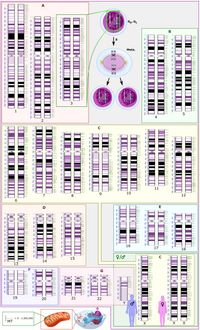
Photo from wikipedia
Diffuse alveolar haemorrhage (DAH) is rare in the paediatric population and the biological mechanisms remain poorly understood [1]. We retrospectively studied 12 children at our centre, identified from our pathology… Click to show full abstract
Diffuse alveolar haemorrhage (DAH) is rare in the paediatric population and the biological mechanisms remain poorly understood [1]. We retrospectively studied 12 children at our centre, identified from our pathology database, with idiopathic DAH between 2005–2017 who had undergone lung biopsy (SickKids ethics approval number: 1000029185). Two children in this cohort were offered clinical whole exome sequencing (WES) as an investigational diagnostic procedure based on a family history of lung disease. Both children who underwent WES, including the one presented here and one who we had previously reported [2], had single gene mutations that explained the pathogenesis of their pulmonary haemorrhage. The case of a young boy with pulmonary haemorrhage who was ultimately diagnosed on whole exome sequencing with a rare condition called prolidase deficiency. This case demonstrates the utility of modern genomic testing in paediatric rare lung disease. http://ow.ly/rDGz30o8pcd
Journal Title: ERJ Open Research
Year Published: 2019
Link to full text (if available)
Share on Social Media: Sign Up to like & get
recommendations!